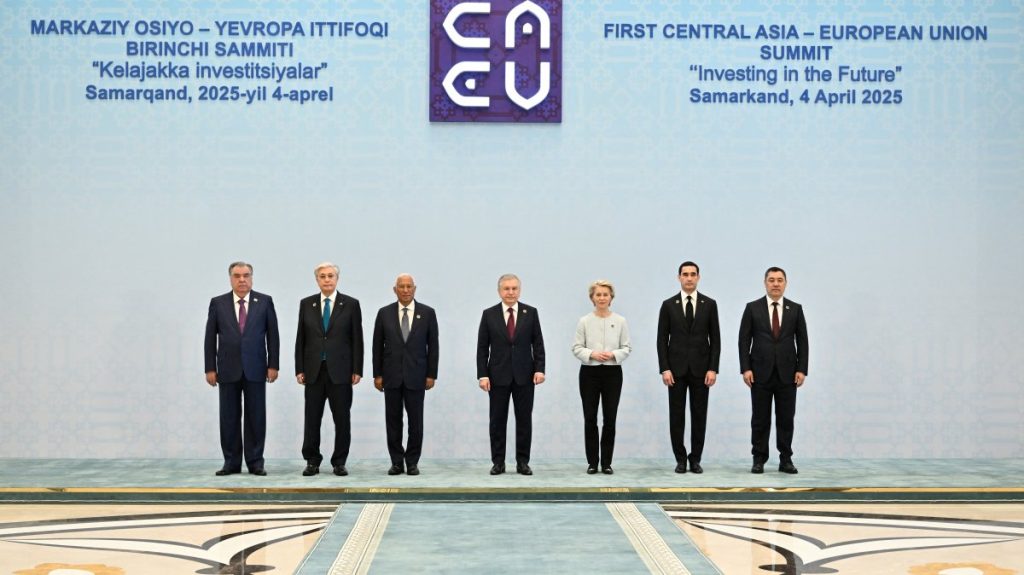In a significant diplomatic development, three full members of the Organization of Turkic States (OTS) – Uzbekistan, Kazakhstan and Kyrgyzstan – along with observer state Turkmenistan, have formally recognized the Greek Cypriot administration, breaking from Türkiye’s longstanding diplomatic strategy in the divided island of Cyprus. This shift is seen as a major setback for Türkiye’s efforts to gain broader international recognition for the Turkish Republic of Northern Cyprus (TRNC).
The decision to establish diplomatic ties with the Greek Cypriots and align with United Nations Security Council (UNSC) resolutions that advocate the Greek Cypriot administration’s status as the sole legitimate government of Cyprus has sparked strong criticism in Ankara. The move came amid growing ties between the European Union and Central Asian states, which have become increasingly important in the EU’s geopolitical calculus. These shifts were likely influenced by the EU’s investment offers and diplomatic overtures made during the EU-Central Asia summit, held in Samarkand, Uzbekistan, on April 3-4.
Speaking on the issue to Daily Sabah, TRNC Foreign Minister Tahsin Ertuğruloğlu said: “We have to keep our feet on the ground. This is not a disaster scenario. On the other side, we do not cheer their decision.”
Ertuğruloğlu emphasized the need for patience in international relations, noting that this is not the end of efforts to increase recognition of the Turkish Cypriots and their rights.
Reminding that the TRNC already has observer status in the OTS, the minister continued: “The one who has to be criticized here is the EU.” He said that although the bloc champions human rights, the EU’s latest move through the OTS again confirmed ignoring the needs of the Turkish community on the island.
The decisions of the Turkic states were outlined in a series of reports in the days following the summit. On April 8, Greek City Times reported the coordinated recognition, which was followed by a diplomatic delegation from these countries being sent to the Greek Cypriot administration. The following day, Times of Central Asia noted that this development had created fractures within the Turkic world, while Eurasian Times analyzed the broader geopolitical implications, suggesting that EU influence was behind the realignment.
For Ankara, this move has been seen as a blow to its decades-long efforts to have the TRNC recognized by the international community. Türkiye has long supported the idea of a two-state solution for Cyprus, but it has struggled to gain widespread global support for this position. The EU’s increasing investment in Central Asia, combined with the bloc’s diplomatic influence, is seen as a key factor behind the Central Asian countries’ decisions.
The decision by Turkmenistan, which is not a full member of the OTS but holds observer status, to recognize the Greek Cypriot administration carries particular weight. Known for its traditionally neutral foreign policy, Turkmenistan’s stance highlights a significant shift in the region’s diplomatic orientation, further aligning Central Asia with the EU’s broader geopolitical strategy.
In the wake of these developments, Kürşad Zorlu, deputy chair of the ruling Justice and Development Party (AK Party), convened a meeting with the ambassadors of the Turkic states on Tuesday. Zorlu emphasized the importance of maintaining solidarity among the Turkic nations and urged them to prioritize cooperation on regional issues, including the Cyprus issue. He reaffirmed Türkiye’s commitment to a just and lasting solution for Cyprus, one that would reflect the realities of the island’s division.
While some Turkish outlets have speculated that the EU may have played a role in pressuring the Central Asian countries to align with the Greek Cypriot administration, it remains unclear whether Türkiye will take concrete steps in response. Turkish officials have privately expressed concerns that this decision could set back their efforts to gain broader international recognition for the TRNC, further complicating the diplomatic landscape surrounding Cyprus.
The EU’s engagement with Central Asia is part of a broader strategy to strengthen economic and political ties with the region. The EU-Central Asia summit, which focused on deepening ties between the EU and Central Asia, saw the EU offer investment in key sectors, including energy, infrastructure and trade. The EU’s approach has been to present itself as a reliable partner in the region, contrasting its commitments with those of China and Russia, whose influence is increasing. The growing EU-Central Asia relationship is widely seen as a factor that shaped the Turkic states’ recent decisions.
The recognition of the Greek Cypriot administration by these Turkic states indicates the EU’s growing influence in the region. By encouraging this realignment, the EU appears to reinforce its stance on Cyprus. It remains to be seen how Türkiye will respond to this as it adheres to the policy of winning over more friends and putting past hostilities behind, especially with Greece.


